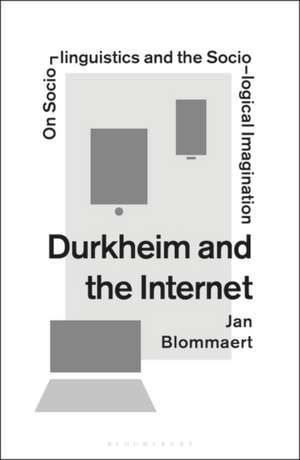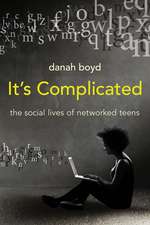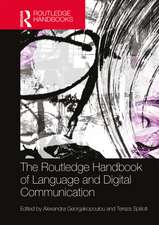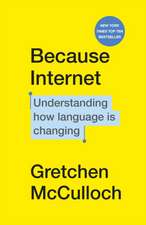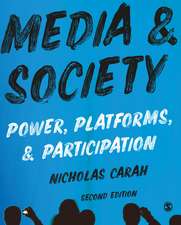Durkheim and the Internet: On Sociolinguistics and the Sociological Imagination
Autor Professor Jan Blommaerten Limba Engleză Paperback – 11 iul 2018
| Toate formatele și edițiile | Preț | Express |
|---|---|---|
| Paperback (1) | 130.49 lei 6-8 săpt. | |
| Bloomsbury Publishing – 11 iul 2018 | 130.49 lei 6-8 săpt. | |
| Hardback (1) | 402.77 lei 6-8 săpt. | |
| Bloomsbury Publishing – 11 iul 2018 | 402.77 lei 6-8 săpt. |
Preț: 130.49 lei
Preț vechi: 143.05 lei
-9% Nou
Puncte Express: 196
Preț estimativ în valută:
24.98€ • 27.14$ • 20.99£
24.98€ • 27.14$ • 20.99£
Carte tipărită la comandă
Livrare economică 21 aprilie-05 mai
Preluare comenzi: 021 569.72.76
Specificații
ISBN-13: 9781350055186
ISBN-10: 1350055182
Pagini: 136
Dimensiuni: 129 x 198 x 13 mm
Greutate: 0.16 kg
Editura: Bloomsbury Publishing
Colecția Bloomsbury Academic
Locul publicării:London, United Kingdom
ISBN-10: 1350055182
Pagini: 136
Dimensiuni: 129 x 198 x 13 mm
Greutate: 0.16 kg
Editura: Bloomsbury Publishing
Colecția Bloomsbury Academic
Locul publicării:London, United Kingdom
Caracteristici
Operates under the premise that sociolinguists are a specialized type of sociologist, observing society and social acts through the lens of language and interaction
Notă biografică
Jan Blommaert is Professor of Language, Culture and Globalization and Director of Babylon, Center for the Study of Superdiversity at Tilburg University, the Netherlands.
Cuprins
1. Sociolinguists as sociologists2. Durkheim's social fact2.1 Norms and concepts2.2 Integration and anomie2.3 Durkheim's impact and the challenge of 'Rational Choice'3. Sociolinguistics and the social fact: Avec Durkheim3.1 Language as a normative collective system: ordered indexicality3.2 Language variation: dialects, accents & languaging3.3 Inequality, voice, repertoire3.4 Language, the social fact4. What Durkheim could not have known: Après Durkheim4.1 Preliminary: A theory of vernacular globalization4.2 An indexical-polynomic theory of social norms4.3 A genre theory of social action4.4 A microhegemonic theory of identity4.5 A theory of "light" social groups4.6 A polycentric theory of social integration4.7 Constructures4.8 Anachronism as power5. The sociological re-imaginationReferences
Recenzii
Blommaert's book is a theoretical tour-de-force, entertaining, challenging and immensely enlightening. It encompasses a wide swath of thinking about the relationship between language and society, both in history and now.
Once again, Blommaert challenges sociolinguists to reflect on our discipline in new and exciting ways. While we have long devoted much energy to the linguistic half of the sociolinguistic equation, here Blommaert makes a compelling argument for engaging more fully with the social half, and for the relevance of classical sociology to understanding the new ways language is being used in the age of globalisation and digital communication.
In this concise but absorbing book, Blommaert provides a highly persuasive argument for why sociology should engage seriously with research into language. In doing so he details the profound and wide-ranging benefits that the study of communicative interaction can offer for a theorization of society in general. The book is likely to become essential reading for both sociolinguists, sociologists, and those interested in the ways that digital media are transforming the modern world.
Once again, Blommaert challenges sociolinguists to reflect on our discipline in new and exciting ways. While we have long devoted much energy to the linguistic half of the sociolinguistic equation, here Blommaert makes a compelling argument for engaging more fully with the social half, and for the relevance of classical sociology to understanding the new ways language is being used in the age of globalisation and digital communication.
In this concise but absorbing book, Blommaert provides a highly persuasive argument for why sociology should engage seriously with research into language. In doing so he details the profound and wide-ranging benefits that the study of communicative interaction can offer for a theorization of society in general. The book is likely to become essential reading for both sociolinguists, sociologists, and those interested in the ways that digital media are transforming the modern world.
